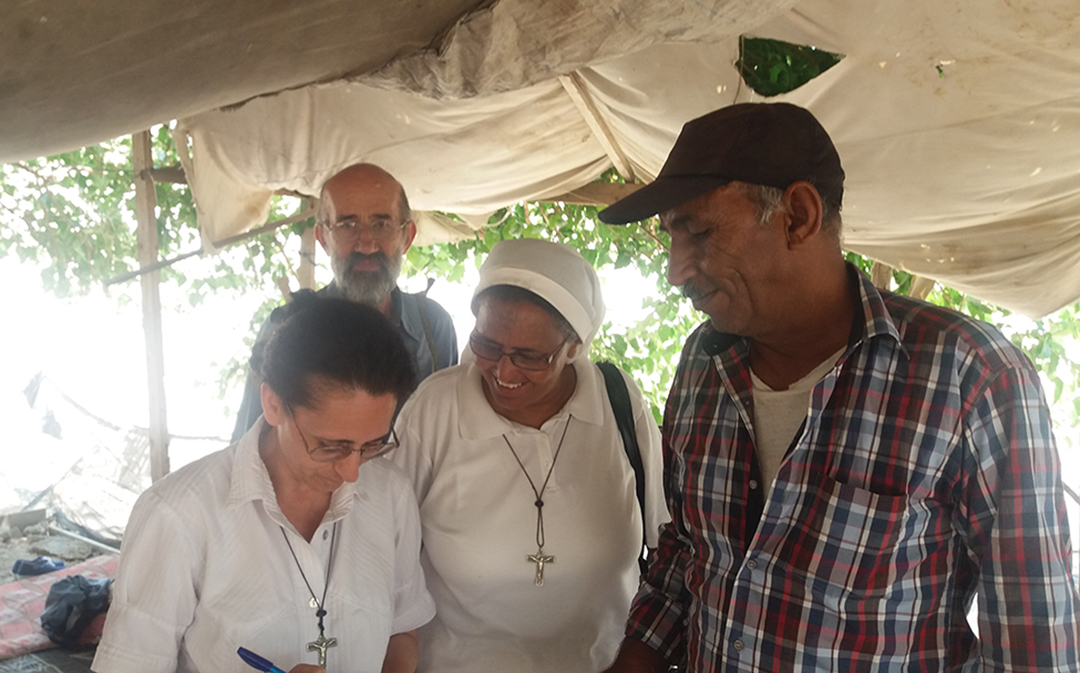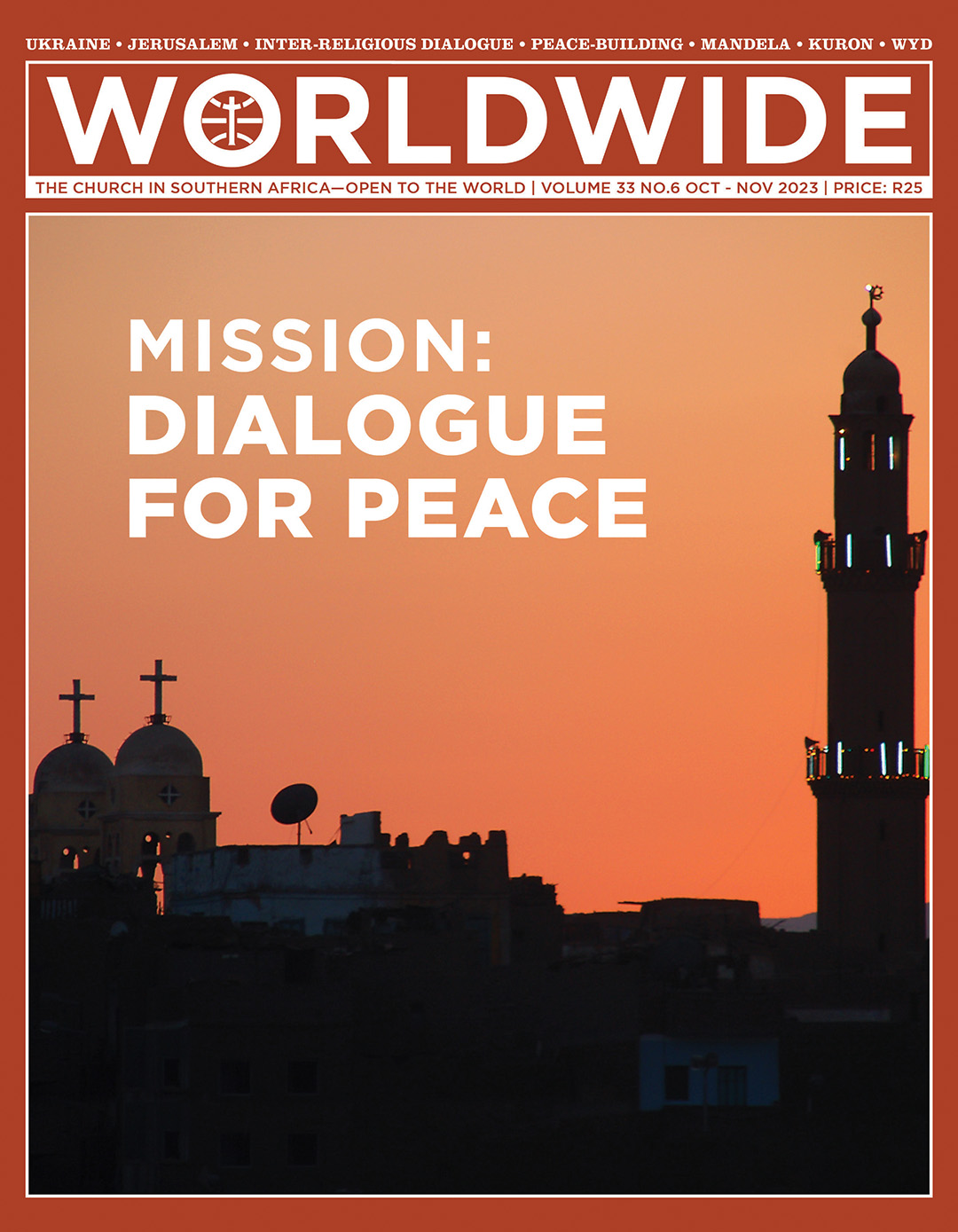
MISSION: DIALOGUE FOR PEACE
The Mosque minarets and church domes of the front cover, facing each other at twilight, transmit a sense of harmony and serenity. The two main religions of the world, Christian and Islam, are called to a mutual understanding and peace-building for the well-being of humanity. The essence of its traditions, far from fundamentalist interpretations, should lead their faithful to pursue together the values of justice and fraternity.
SPECIAL REPORT • PEACE FOR UKRAINE
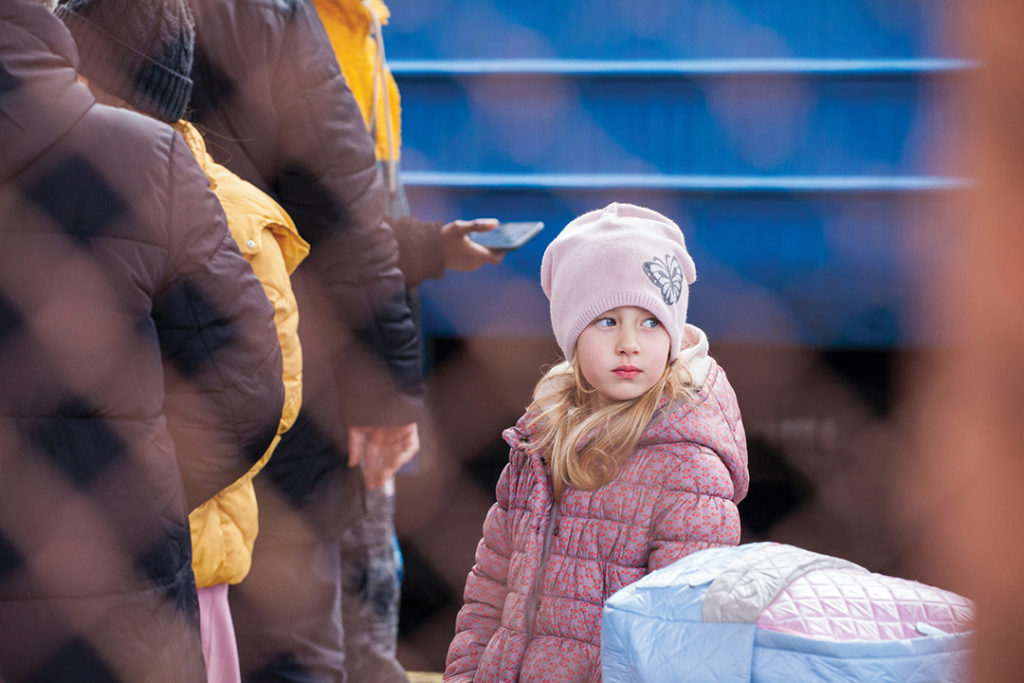
Gestures of Humanity
Pope Francis has been consistently encouraging Catholics and the global community to focus on dialogue and other gestures of humanity to end the mass slaughter in Ukraine. He appointed Cardinal Zuppi as the Vatican envoy to promote diplomacy. With this attention to gestures of humanity, we may consider a needs-based diplomatic style with a strategic sequence of steps toward a just peace
BY Eli McCarthy*
IN DISCERNMENT with Catholic partners, a group of us heard the explicit call from the Mayor of Kyiv to send religious leaders to the city as the war was beginning to unfold. We organized an interfaith Just Peace Delegation on 24-25 May 2022 as a gesture of humanity. Similar to the practical accompaniment that Pope Francis models, this delegation included seventeen religious leaders from Muslim, Jewish, and Christian communities within Europe and the United States.
Non-violence actions
Later that year, a very significant October report identified at least 235 non-violence actions of resistance in Ukraine between 24 February and 30 June 2022. These were also practical gestures of humanity.
The researchers found that non-violence resistance:
- hindered some of the long-term military and political goals of the Russian authorities, such as the institutionalization of the military occupation and repression in the occupied territories
- protected many civilians;
- undermined the Russian narrative
- built community resilience;
- strengthened local governance
- built social cohesion
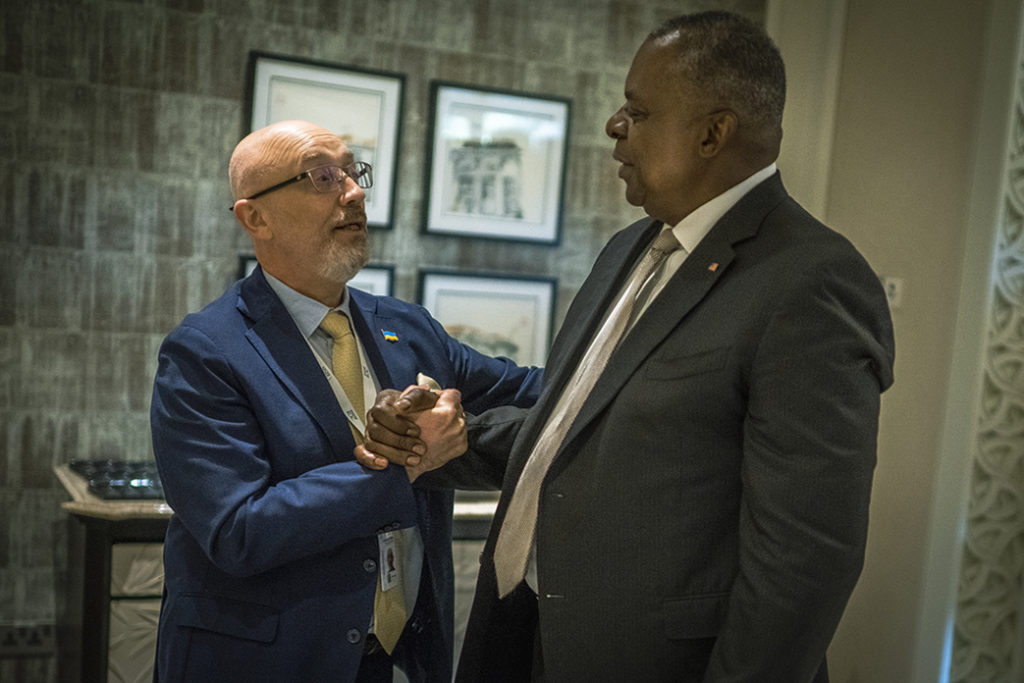
Minister of Defence of Ukraine, in Singapore, June 2, 2023.
Credit: Chad J. McNeeley/ U.S. Secretary of Defense/Flickr.
Non-violence actions hindered the military occupation by blocking trucks, thus slowing down their movements. Protests made the control of the occupied areas quite difficult. This type of action protected civilians throughout evacuations, providing shelter, psychosocial support, negotiations with Russian soldiers to release residents, and focus on negotiation tactics, which limited the casualties in the area. Non-violence protest actions in Kherson debunked and challenged Russian propaganda about ‘liberation’. These actions generated social cohesion through dialogue and mediation.
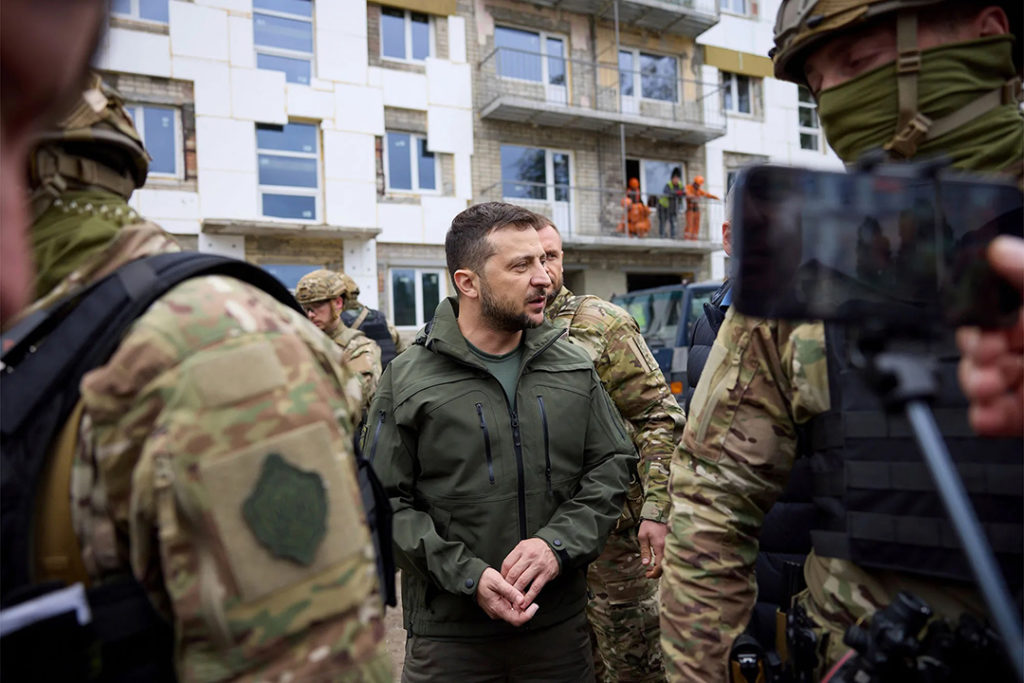
In August, I joined the Peace Action, Training and Research Institute of Romania, along with organizations from Italy and the Netherlands on a trip to Ukraine to meet leading Ukrainian non-violence activists and peacebuilders. We heard their stories of resistance as well as their needs for support and resources. Some stories included farmers refusing to sell grain to Russian soldiers; fire departments refusing to join Russian structures; unarmed civilians hiding and protecting local administration officials and school directors; the creation of an alternative government; and the engagement of Russian civil society with anti-war messaging.
Those we met required:
- sharing of their examples of non-violence resistance
- advocacy to their government and the support of other governments in developing a non-violence strategy of non-co-operation with the occupation
- financial resources, strategic campaign training, and technology/digital security
- that they not be left alone!
One of the conflicts monitors we met in Kharkiv, resourced by the UN, said that in the occupied areas where non-violence resistance was the primary method, this approach decreased the repression. However, in the occupied areas or nearby, when the Ukrainians primarily leaned on violent resistance, this increased the repression.
Importance of an integrated dialogue
I came to understand more deeply through a just peace orientation that, to break the dynamic of violence, conflicting parties must engage in dialogue that reflects the needs of the people. The dialogue should be consistent and flexible while mitigating the trauma. This includes political as well as civil society dialogue. However, key political leaders are resisting broader negotiations. Many of them argue that negotiations are only valuable after there is a military advantage on the ground. Such negotiations, rooted in the power of domination, rarely if ever, yield sustainable solutions, since re-humanization; consideration of grievances and needs; trauma; as well as paths to reconciliation; are not adequately incorporated.
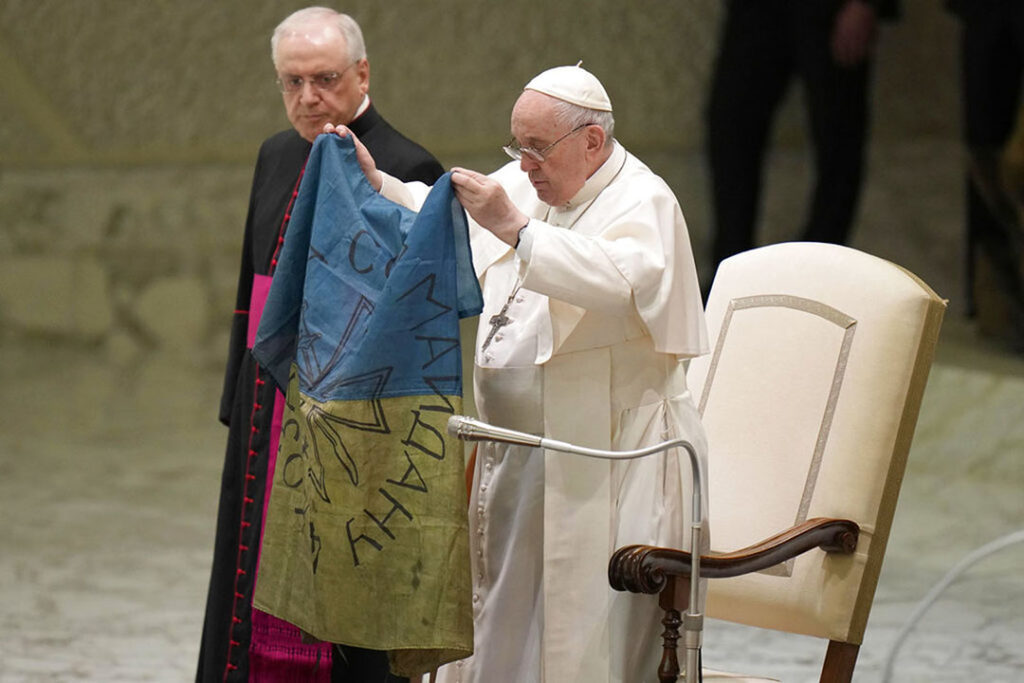
To engage in such dialogue, it’s important to acknowledge that this war has been going on since 2014. Political conflict had led to the Maiden demonstrations that changed Russian-leaning government leadership. Violence ensued from both sides since Russia annexed Crimea. The 2015 Minsk agreements called for a number of provisions, which included dialogue with eastern political leaders to shape a form of political autonomy while remaining part of Ukraine. Instead, the Ukrainian government leaned into armed counter-terrorism operations and increased militarization for seven years (supported by the U.S. and UK), with steady escalation from both sides including Russian involvement, and ultimately failure to implement Minsk. Over 14 000 people were killed during those seven years. In 2022, as shelling seemed to increase, leadership from key areas in the Donbass region declared independence and some of those leaders apparently signalled a desire for larger Russian invasion.
Former German chancellor Angela Merkel acknowledged that the Minsk II agreement was made to give Ukraine time to strengthen its military. However, it was not implemented by Ukraine, and President Zelensky acknowledged that he had no intention to implement it.
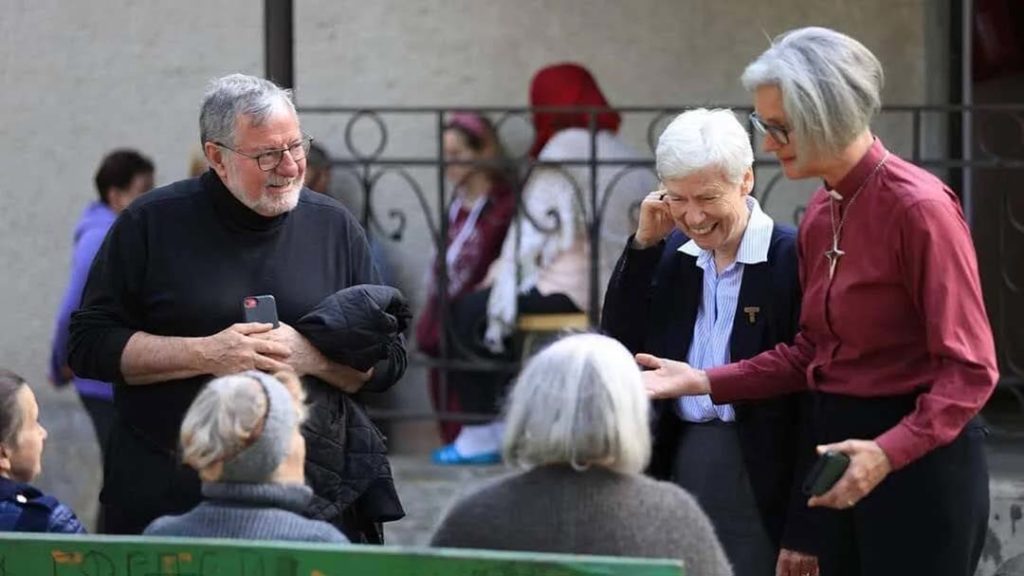
Since the invasion of 2022, we do know that some mediated dialogues have succeeded with agreements on the shipment of grain for a year; prisoner swaps; and some evacuation routes. Early on, in March 2022, there was also considerable progress on ending the war. On March 28th, Jeffrey Sachs said: “President Zelensky declared that Ukraine was ready for neutrality combined with security guarantees as part of a peace agreement with Russia”. At that time, Zelensky further said: “security guarantees and neutrality, the non-nuclear status of our state; we’re ready to do that. That’s the most important point…they started the war because of that.”
Averted peace negotiations
It seems from reports, that UK Prime Minister Johnson, pressed Ukraine to stop negotiations on April 9th in Kyiv. We heard from U.S. leaders like Defence Secretary, Austin, and former Secretary of State, Hillary Clinton, that we should drain Russian resources. During an appearance on the American Television channel MSNBC, former Secretary of State and Democratic Presidential candidate, Hillary Clinton, said that the “model” moving forward should be that of the Afghan insurgency against Soviet occupation, which lasted ten years in the 1980s. Regarding Johnson, Ukrainian media reported, and former Israeli Prime Minister Bennet confirmed (see 2:30-3:02), that:
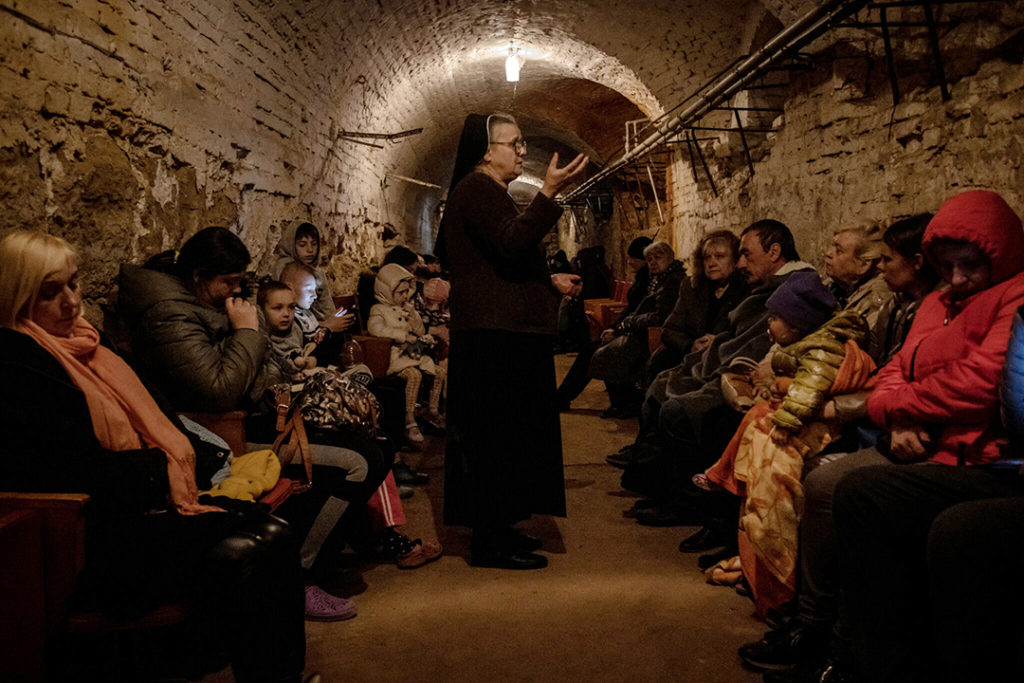
“As soon as the Ukrainian negotiators and Abramovich/Medinsky, following the outcome of Istanbul, had agreed on the structure of a possible future agreement in general terms, UK Prime Minister Boris Johnson appeared in Kyiv almost without warning…Johnson brought two simple messages to Kyiv. The first is that Putin…should be pressured, not negotiated with. The second is that even if Ukraine is ready to sign some agreements on guarantees with Putin, they are not.”
Key political leaders are resisting broader negotiations
In contrast, if the stakeholders lean into a consistent needs-based style of diplomacy, what might the relevant needs of Ukraine, and even those of Russia be? For Ukraine, such needs might include security, accountability, respect, consistency, independence, self-determination, and participation. Some of the relevant needs for Russia might be respect, purpose, security, and accomplishment. Acknowledging the needs of any stakeholder does not of course justify, or legitimate any strategy that is being used, for instance, the Russian military invasion in February 2022. Yet, such a discovery or acknowledgement of needs may help to cultivate the necessary ethos for the stakeholders to better identify the strategies or agreements that might be possible to end the war, and lean into a more sustainable just peace.
Paths to peace
Entering into a robust diplomatic process would of course be a sequence of steps, including minimizing pre-conditions, as well as incentivizing and monitoring ceasefires. To generate an ethos for such a process, trauma-mitigation exercises for political leaders would enhance the potential. There would likely be some initial agreements around prisoners; demilitarized buffer zones; missing Ukrainian children and refugees etc. Even if some of the initial stages and agreements don’t return all of Ukraine’s territory right away, there can still be strategies developed toward those ends through next stage agreements, as trust is increased. Such strategies can also include supporting and resourcing non-co-operative and non-violence resistance within those occupied areas, as well as possible agreements for UN or for International non-governmental organizations (INGOs) to monitor elections in those areas. Additional steps would address security architecture; accountability for harm; rebuilding and social healing etc. However, most important for a sustainable, just peace is that strategies be rooted in and consistent with the needs identified.

Credit: The Russian Presidential Press and Information Office/ snl.no/
It is urgent that the global community organize and advocate diplomacy based on the actual needs of both countries. At the one-year anniversary of the invasion in Feb. 2023, there were substantial demonstrations in Europe to focus on diplomacy, as well as similar increasing activity in the U.S. In June 2023, African leaders made notable diplomatic efforts but more can be done. From Sept. 30th – Oct. 8th, there will be Global Days of Action for Peace in Ukraine. This will be another opportunity to mobilize our local communities, and as Christians, an occasion for our faith communities to advocate for diplomacy to break the cycle of hostility and illuminate our shared human dignity.
*Prof. Eli McCarthy, PhD, teaches Peace Studies at Georgetown Washington University. Author of numerous books and academic articles on non-violence and peace-making issues, he participates in national religious advocacy coalitions for peacebuilding practices. He has travelled to Haiti to work with the poor; worked with homeless persons in Boston and DC; and monitored the Palestinian Elections in 2006 with the Non-violence Peace Force. He has recently been involved in various initiatives of peace and non-violence in Ukraine.

